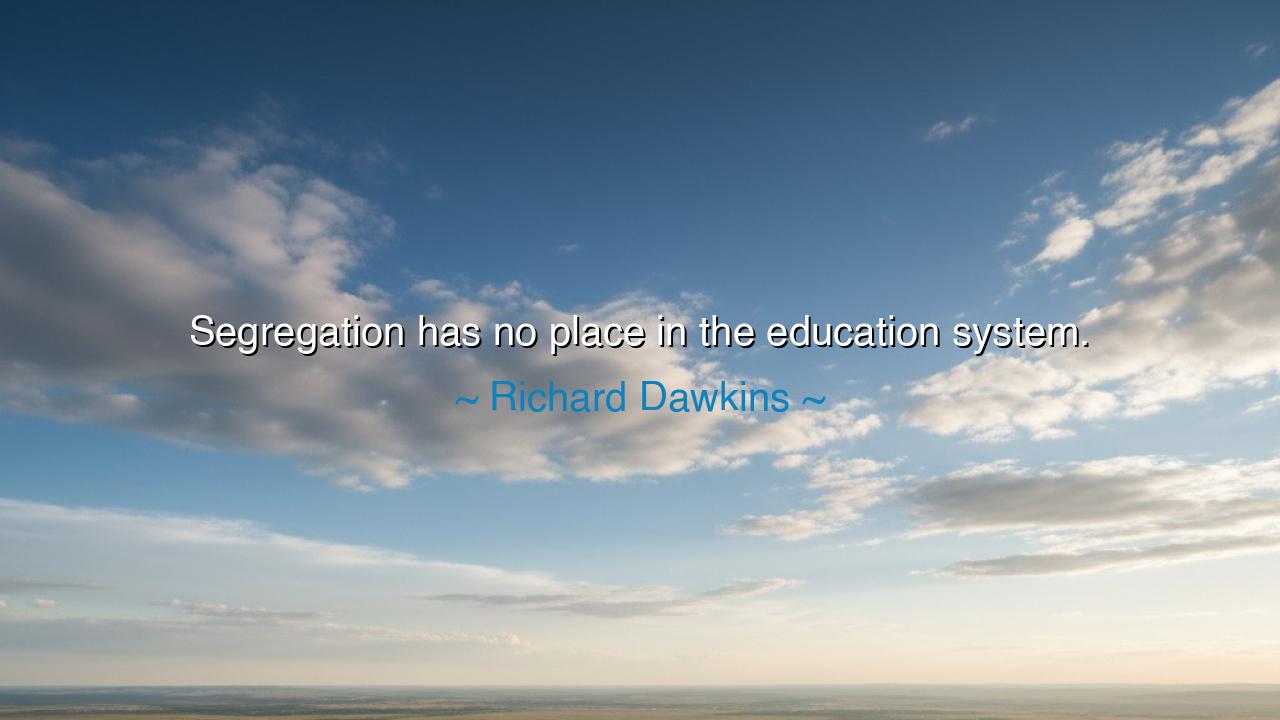
Segregation has no place in the education system.






Richard Dawkins once declared with uncompromising clarity: “Segregation has no place in the education system.” In these few words lies a thunderclap of moral conviction. For what is education if not the awakening of the mind to truth, and what is segregation if not the closing of doors, the narrowing of vision, the deliberate planting of division where there should be unity? Dawkins, who has spent a life championing reason and enlightenment, here points to a truth as old as civilization itself: that knowledge must be shared freely, without walls of prejudice or separation.
The meaning of this quote is not only political but deeply human. To segregate in the house of learning is to poison the well of wisdom at its source. For how can truth flourish when children are divided by race, creed, wealth, or birth? How can the light of knowledge shine when barriers are raised to keep some in shadow while others bask in the sun? True education demands openness, inclusivity, and equality, for it is through diversity of voices, stories, and experiences that wisdom matures. To segregate is to cripple not just the excluded, but the whole society that refuses to learn together.
The history of the world offers us solemn testimony. In the United States, during the long years of racial segregation, Black children were forced into underfunded schools, denied the same books, the same teachers, the same chance as their white peers. Yet in 1954, the Supreme Court’s decision in Brown v. Board of Education thundered forth the truth: that “separate but equal” was a lie, and that segregation in schools was a violation of the very spirit of democracy. That moment, born of struggle and sacrifice, embodied Dawkins’ declaration—segregation has no place in the education system—for education divided is education betrayed.
But this truth stretches beyond race. In many lands, children are still segregated by gender, by religion, by caste, or by wealth. The wealthy child studies in palaces of learning while the poor child strains for scraps of knowledge. The boy is told he may reach the stars, while the girl is told her place is on the ground. Such divisions, though justified by tradition or power, are shackles upon the future. For when one half of humanity is denied the fullness of learning, all of humanity stumbles.
Dawkins, though a scientist, speaks here as a moral philosopher. For knowledge without justice is dangerous, and education without equality is hollow. The schoolroom must be the sanctuary where barriers are torn down, where a child from any background may look upon another not as “other,” but as fellow seeker of truth. To segregate is to tell a lie about the human spirit—that some are worthy of wisdom, while others are not. And such a lie corrodes the soul of nations.
The lesson we draw is this: we must guard the sanctity of education as the great equalizer. Parents, teachers, and leaders must resist every attempt to divide, whether by law or by subtle prejudice. Children must be taught not only facts, but fellowship—that learning is a shared journey, not a private hoard. Citizens must demand that schools be funded and structured to serve all equally, for the strength of a nation lies not in the privilege of the few, but in the enlightenment of the many.
So what must we do? Stand against every form of segregation in learning. Support schools that welcome diversity. Mentor those who lack opportunity. Share knowledge freely, remembering that wisdom grows not when guarded, but when given. Let every classroom become a temple where children of every background kneel before the same altar of truth. For in such unity lies the promise of a brighter tomorrow.
Thus, carry Dawkins’ words as a sacred command: “Segregation has no place in the education system.” For when all learn together, all rise together. And when barriers fall in the house of knowledge, then, and only then, may humanity walk forward into the fullness of its destiny.






AAdministratorAdministrator
Welcome, honored guests. Please leave a comment, we will respond soon